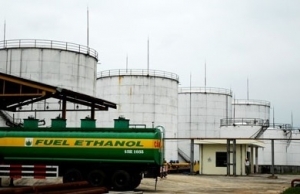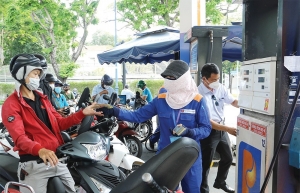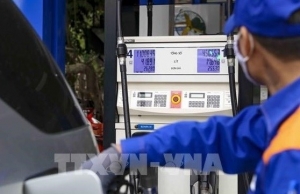Allowing businesses more of a say in petrol price structure
If companies lack money, it is mainly their problem. However, if an enterprise cannot actively import goods at any time, the disadvantage belongs to the management agency. Despite this current issue, it is completely possible to change the way management agencies return the initiative to businesses and still achieve their goals.
 |
| Allowing businesses more of a say in petrol price structureA streamlining of management in determining petrol price structures could help the overall system, photo Le Toan |
stry and Trade Nguyen Hong Dien spoke at the National Assembly on the morning of October 22 and stated that the reason many businesses lack money to import petrol is due to credit difficulties.
According to Dien, key businesses, distributors, and agents when doing business in this field are all in need for a loan by the bank. This limit was prescribed in advance, when the price of petrol was only $50-60 per barrel. Currently, the price has increased twice, but the credit limit is still the same, leaving businesses no money to import goods, as Dien stated.
At present, Petrolimex accounts for about half of the national petroleum market share, while PV Oil covers about a fifth. Both companies are state-owned enterprises.
Consolidated revenue in the first six months for Petrolimex was $6.1 billion while and PV Oil’s was $2.16 billion. Petrolimex’s gross profit margin was 3.4 per cent of revenue, while that of PV Oil was 4.6 per cent.
Petrolimex’s short-term assets are $2.2 billion, of which receivables and inventories are $1.37 billion. Meanwhile, PV Oil’s short-term assets are $1.12 billion, of which receivables and inventories are $724 million. If working capital turnover is calculated according to receivables and inventories, in the first six months of the year, Petrolimex’s capital turned 4.4 times, while PV Oil’s did so thrice.
Petrolimex capital needs for business are narrower than PV Oil’s because the capital turnover must be faster to have enough resources. If counting all short-term assets, in six months Petrolimex’s assets need to rotate 2.8 rounds, and PV Oil’s 1.9 rounds. With this turnover, there is not necessarily a shortage of capital unless the inventory demand is higher and the payback period of the receivables is slower. Petrolimex has $169 million of long-term bond, only 5 per cent of total assets, and therefore lacks working capital.
In terms of business performance, both companies have very low profit margins compared to their revenue. Petrolimex reached VND118 (0.48 US cents) per share, while PV Oil reached VND516 (2.1 US cents) per share. Thus, PV Oil has better results than Petrolimex – maybe because PV Oil belongs to PetroVietnam and has favourable trading in crude oil.
Thus, saying that petroleum companies lack capital to import petrol and oil because of their investment in securities is not necessarily correct. Low business efficiency is causing businesses to lack motivation and no longer see any room for controlled selling prices of retail stores. The stock prices also dropped to a low at the end of the session on October 26.
The cost of petrol is an input for many goods and services. Amid the continuous fluctuations in the price of petrol, the prices of all other kinds of goods also fluctuate. For instance, taxi prices and logistics prices may have to be adjusted. However, these businesses always know how to adjust the prices to ensure business benefits for the whole year while not affecting customer behaviour.
Operating petrol and oil sales with a price stabilisation fund, as done presently, can help not to adjust petrol prices too often. But, when the stabilisation fund cannot meet the price fluctuation range, how can businesses be proactive and remedy the supply shortage?
To manage prices, the Vietnamese government is setting a standard that includes all intermediary costs and profits of enterprises. However, when the management agency has to constantly determine such new standards, it will never be synchronised.
Therefore, regulators should only decide in absolute values. At some point, the enterprise will decide on its own, so there is no need to worry about the enterprise buying petrol at a high price because there are many input clues for comparison. With this management, the ministries and sectors are not caught up in the market and are not involved in the daily operations of businesses.
Changing management habits is very difficult. However, looking back at the market in 1986, no-one was worried about removing the subsidy. Reality has proven that the work of the people and businesses is taken care of by the people and businesses, and the state does the work and the management of the state. If the state management agency continues to decide the selling price for petrol and oil enterprises while the market fluctuates continuously, it will continue to be as chaotic as it is today.
It seems that according to the current management mechanism, not only the Ministry of Industry and Trade but also the Ministry of Finance – and possibly other ministries and sectors – are involved.
The more agencies jointly decide, the more difficult it is for the business to operate. Let the business proactively determine the selling price and time of application. At the end of the year, regulators only need to check the total value added, and enterprises that exceed the limit must adjust in the next period or pay the difference to the budget.
 | Ministry proposes tariff cuts to bring down petrol prices The Ministry of Finance (MoF) has proposed a reduction of the most favoured nation (MFN) tariff on a number of petrol products widely used in industrial production from 20 per cent to 10 per cent in an attempt to bring down the economy's input cost. |
 | Understanding global oil and gas sector management Decree No.95/2021/ND-CP on petroleum trading officially took effect at the beginning of the year and was expected to strengthen the market. However, the continuous changes in gasoline prices, combined with the inadequacies in management, has had a great impact on market supply and demand and also pushed the business and consumer world into unprecedented difficulties. The question of how to foster a healthy market and ensure energy security has not been resolved. |
 | Petrol prices down in latest adjustment Retail prices of oil and petrol dropped from 3pm on October 3 following the latest adjustment by the Ministry of Industry and Trade, and the Ministry of Finance. |
What the stars mean:
★ Poor ★ ★ Promising ★★★ Good ★★★★ Very good ★★★★★ Exceptional
Related Contents
Latest News
More News
- Temporary relief for food imports as businesses urge overhaul of regulations (February 07, 2026 | 09:00)
- Opella and Long Chau join forces to enhance digestive and bone health (February 06, 2026 | 18:00)
- Vietnam-South Africa strategic partnership boosts business links (February 06, 2026 | 13:28)
- Sun PhuQuoc Airways secures AJW Group support for fleet operations (February 06, 2026 | 13:23)
- Pegasus Tech Ventures steps up Vietnam focus (February 05, 2026 | 17:25)
- The generics industry: unlocking new growth drivers (February 04, 2026 | 17:39)
- Vietnam ready to increase purchases of US goods (February 04, 2026 | 15:55)
- Steel industry faces challenges in 2026 (February 03, 2026 | 17:20)
- State corporations poised to drive 2026 growth (February 03, 2026 | 13:58)
- Why high-tech talent will define Vietnam’s growth (February 02, 2026 | 10:47)

 Tag:
Tag:




















 Mobile Version
Mobile Version